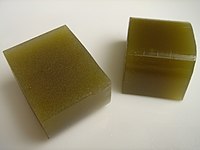
Photo from wikipedia
Improved nutrient use efficiency together with the use of biostimulants have been little explored thus far to improve fruit yield and quality in economically relevant crops. The aim of this… Click to show full abstract
Improved nutrient use efficiency together with the use of biostimulants have been little explored thus far to improve fruit yield and quality in economically relevant crops. The aim of this study was to determine the additive or synergistic effects, if any, of the application of an enzyme hydrolyzed animal protein biostimulant (Pepton) combined with priming with low nitrogen (N) in the production and quality of greenhouse tomatoes. Biostimulant treatment (Pepton at a dose equivalent of 4 kg/ha) was applied by ferti-irrigation for 2 months during the vegetative phase both in controls (watered with nutrient solution) and nutrient efficient crop (NEC), in which plants were primed with low N by exposing them to a 30% N deficiency for 2 months, and then recovered for 1 month before fruit production. Foliar water and N contents, pigments, maximum PSII efficiency (Fv/Fm ratio), and phytohormones [including abscisic acid (ABA), salicylic acid (SA), jasmonic acid (JA), and cytokinins] were measured prior and at 4 and 8 weeks after the first application. Fruit production and quality [as indicated by total soluble sugars (TSS) and acidity (TA), and the contents of lycopene, vitamin E, and vitamin C] were measured 1 month later at harvest. Priming with low N availability (NEC plants) doubled (p < 0.001) fruit production (due to an increase in the number of fruits), tended to increase (p = 0.057) by 20% the amount of TSS and increased (p < 0.05) the contents of lycopene (by 90%) and vitamin E (by 40%). Pepton displayed a tendency, almost significant, to improve (p = 0.054) total fruit production both in control and NEC plants, thus showing an additive effect to low N priming in boosting fruit production. Pepton maintained fruit quality in terms of sugar accumulation, total acidity and the contents of carotenoids, vitamins C and E. Pepton-related improvement in fruit production seemed to be related, at least partially, to an increased accumulation of cytokinins and photosynthetic pigments in leaves, which might favor vegetative vigor and ultimately fruit yield. In conclusion, Pepton application was effective in improving the yield of greenhouse tomatoes showing additive effect with low N priming, without negatively affecting fruit quality.
Journal Title: Frontiers in Plant Science
Year Published: 2022
Link to full text (if available)
Share on Social Media: Sign Up to like & get
recommendations!